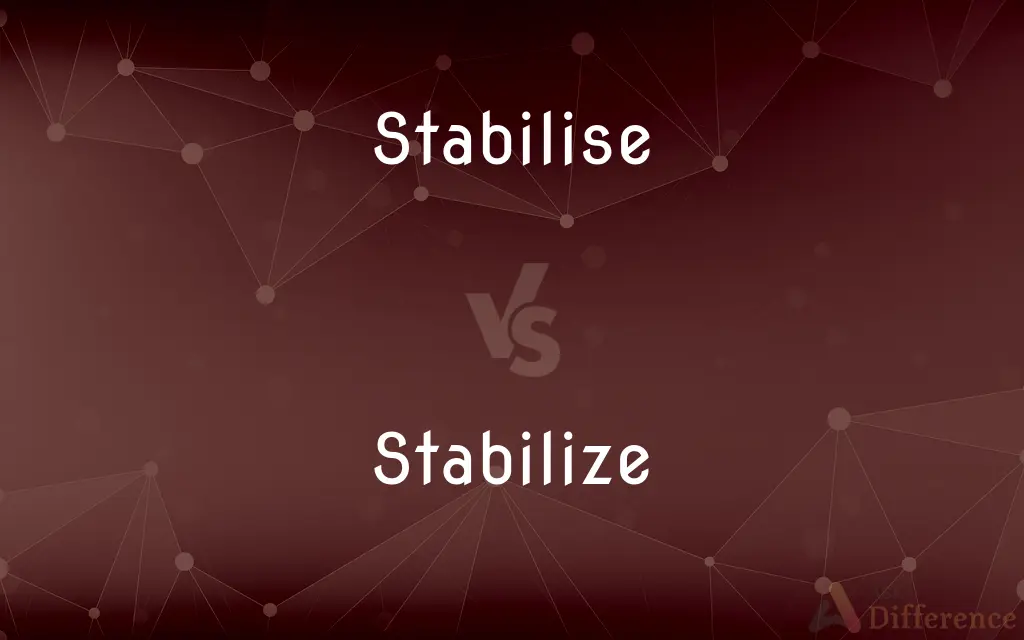Stabilise vs. Stabilize — What's the Difference?
Edited by Tayyaba Rehman — By Fiza Rafique — Updated on March 21, 2024
Stabilise and stabilize both refer to making something steady or firm, but the former is preferred in British English, while the latter in American English.

Difference Between Stabilise and Stabilize
Table of Contents
ADVERTISEMENT
Key Differences
Stabilise is the spelling commonly used in British English to describe the action of making something steady, firm, or less likely to change. On the other hand, stabilize is the preferred spelling in American English, but both terms carry the same meaning and usage in their respective dialects.
When it comes to scientific or technical contexts, such as discussing the stabilization of chemicals or economic conditions, the choice between "stabilise" and "stabilize" often depends on the regional or publication standard. Whereas, in American publications or documents, "stabilize" is more likely to be used.
In educational settings, students and teachers might encounter "stabilise" or "stabilize" depending on the curriculum's adherence to British or American English norms. Similarly, "stabilize" would appear in American educational materials, maintaining consistency with other American English spellings.
The preference for "stabilise" in British English and "stabilize" in American English extends to derivatives of the word, such as "stabilisation/stabilization" and "stabiliser/stabilizer". This consistency helps maintain clarity and uniformity within each variant of English.
Despite the spelling differences, the fundamental concept of bringing stability or making something less volatile is universally understood with either "stabilise" or "stabilize". The choice between them largely hinges on regional language norms and personal or institutional preference.
ADVERTISEMENT
Comparison Chart
Spelling
Preferred in British English.
Preferred in American English.
Usage
Used in contexts adhering to British norms.
Used in contexts adhering to American norms.
Contexts
Scientific, technical, everyday language.
Scientific, technical, everyday language.
Educational Material
Found in British English curriculums.
Found in American English curriculums.
Derivatives
Stabilisation, stabiliser.
Stabilization, stabilizer.
Compare with Definitions
Stabilise
To make or become steady and less likely to change.
The engineers worked to stabilise the structure after the earthquake.
Stabilize
To make or become unlikely to give way or overturn.
The pilot managed to stabilize the aircraft during turbulence.
Stabilise
Commonly used in British English speaking regions.
The government introduced new policies to stabilise the economy.
Stabilize
In scientific, technical, and everyday language.
We need to stabilize the temperature in this room for the experiment.
Stabilise
In scientific, technical, and everyday contexts.
Adding a counterweight helped to stabilise the balance.
Stabilize
Preferred in American English speaking regions.
Efforts were made to stabilize the fluctuating market prices.
Stabilise
Stabilisation, stabiliser.
The stabilisation of the chemical compound was crucial for the experiment.
Stabilize
Incorporated into American educational materials.
In physics class, students learn about forces used to stabilize structures.
Stabilise
Taught and used in British educational systems.
Students learn how to stabilise chemical reactions in their chemistry class.
Stabilize
Stabilization, stabilizer.
The role of the stabilizer in the solution is to maintain pH levels.
Stabilise
Alternative spelling of stabilize
Stabilize
Make or become unlikely to give way or overturn
The craft was stabilized by throwing out the remaining ballast
Stabilise
Support or hold steady and make steadfast, with or as if with a brace;
Brace your elbows while working on the potter's wheel
Stabilize
To make stable or steadfast.
Stabilise
Become stable or more stable;
The economy stabilized
Stabilize
To maintain the stability of (an airplane or ship, for example) by means of a stabilizer.
Stabilize
To keep from fluctuating; fix the level of
Stabilize prices.
Stabilize
To become stable, steadfast, or fixed.
Stabilize
(transitive) To make stable.
Jody stabilized the table by putting a book under the short leg.
Stabilize
(intransitive) To become stable.
The country will stabilize after the next election ends.
Stabilize
Support or hold steady and make steadfast, with or as if with a brace;
Brace your elbows while working on the potter's wheel
Stabilize
Become stable or more stable;
The economy stabilized
The economy destabilized rapidly
Common Curiosities
Is one spelling more correct than the other?
Neither spelling is more correct; it depends on the regional English convention being followed.
Do stabilise and stabilize have different meanings?
No, they have the same meaning but differ in spelling based on regional language conventions.
Can the spelling of stabilise/stabilize affect the understanding of text?
Generally, the understanding remains the same, but the spelling can indicate the writer's regional language preference.
Can stabilise and stabilize be used interchangeably?
In an international context, they can be understood interchangeably, but it's best to stick to one spelling style within a document.
Does the internet prefer one spelling over the other?
Online content may lean towards "stabilize" due to the significant influence of American English, but both forms are present.
How do educators decide which spelling to teach?
Educators typically follow the national curriculum standards, which will dictate the use of British or American English spelling.
What is the main difference between stabilise and stabilize?
The main difference is spelling; "stabilise" is used in British English, while "stabilize" is preferred in American English.
Do these terms appear in scientific literature?
Yes, both terms appear in scientific literature, with the spelling often reflecting the regional standard of the publication.
Can using one spelling over the other impact SEO?
Yes, depending on the target audience's region, using the more familiar spelling can improve search engine optimization.
How do I know which spelling to use?
Use "stabilise" for British English contexts and "stabilize" for American English contexts.
In a global company, which spelling should be used?
Global companies often choose one English variant for consistency, so the choice between "stabilise" and "stabilize" would follow that standard.
Are there derivatives of these terms?
Yes, for "stabilise," derivatives include "stabilisation" and "stabiliser." For "stabilize," they include "stabilization" and "stabilizer."
Are there any other words with similar British and American spelling differences?
Yes, words like "organise/organize" and "realise/realize" have similar British and American spelling differences.
Is it acceptable to use both spellings in a single document?
Generally, it's best to maintain consistency with one spelling style within a single document to avoid confusion.
Is stabilize more commonly used than stabilise?
"Stabilize" might be more common globally due to the widespread use of American English in international contexts.
Share Your Discovery

Previous Comparison
Tight vs. Hard
Next Comparison
Concept vs. SymbolAuthor Spotlight
Written by
Fiza RafiqueFiza Rafique is a skilled content writer at AskDifference.com, where she meticulously refines and enhances written pieces. Drawing from her vast editorial expertise, Fiza ensures clarity, accuracy, and precision in every article. Passionate about language, she continually seeks to elevate the quality of content for readers worldwide.
Edited by
Tayyaba RehmanTayyaba Rehman is a distinguished writer, currently serving as a primary contributor to askdifference.com. As a researcher in semantics and etymology, Tayyaba's passion for the complexity of languages and their distinctions has found a perfect home on the platform. Tayyaba delves into the intricacies of language, distinguishing between commonly confused words and phrases, thereby providing clarity for readers worldwide.














































